Key takeaways:
- The Beatitudes challenge traditional notions of happiness, emphasizing inner virtues like mercy and humility over material wealth.
- Practicing compassion daily involves small acts of kindness, active listening, and fostering a sense of community.
- Embracing weakness can lead to personal growth and deeper connections with others, as vulnerability often creates shared understanding.
- Applying the Beatitudes in relationships fosters mercy, peace, and appreciation for diverse perspectives, enhancing relational bonds.
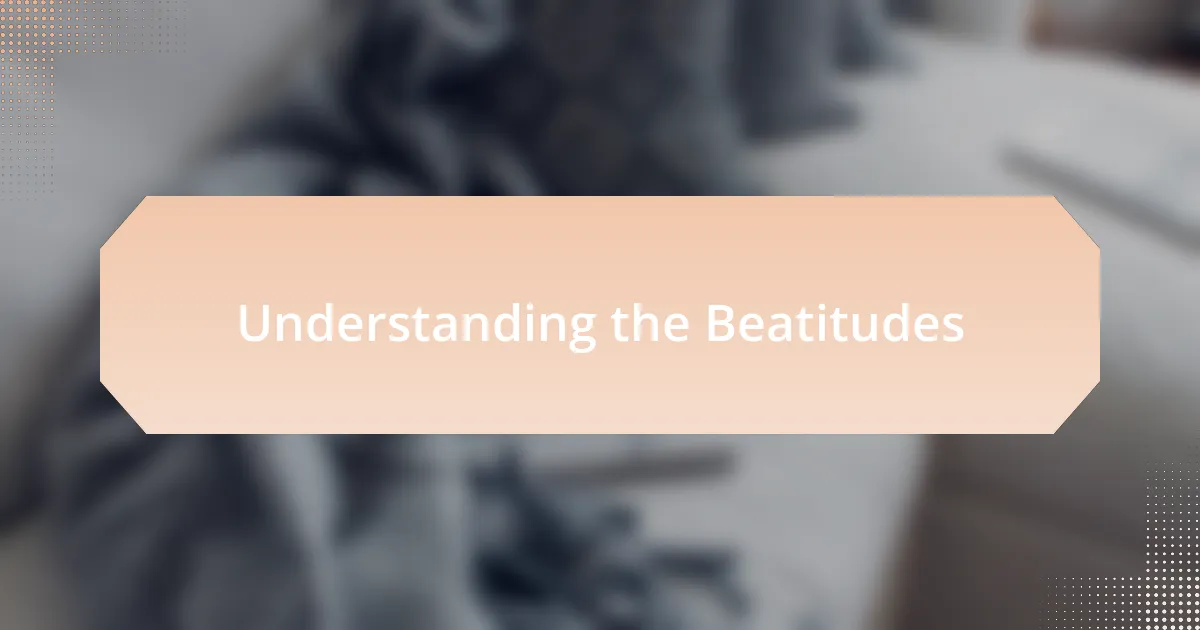
Understanding the Beatitudes
The Beatitudes, found in the Gospel of Matthew, are a series of blessings that Jesus proclaimed during the Sermon on the Mount. Each statement embodies a powerful principle that can transform our understanding of happiness and fulfillment. When I first encountered the Beatitudes, I found myself questioning what it truly means to be “poor in spirit” and how that aligns with my daily life. It felt like a call to recognize my own vulnerability and dependence on God.
These teachings resonate deeply, especially when I reflect on my own experiences of grief and humility. The Beatitude that says, “Blessed are those who mourn, for they shall be comforted,” reminds me of a time when I faced loss. It was in that mourning where I discovered a profound sense of community and support, which reaffirmed my faith that there is healing in shared sorrow. How often do we overlook the strength that comes from vulnerability?
Understanding the Beatitudes encourages us to redefine what it means to be blessed. Instead of equating blessings with material wealth, I’ve come to see them as invitations to cultivate inner virtues, like mercy and purity of heart. I often ask myself, what does it mean to genuinely show mercy in my interactions? Embracing these values not only shapes my character but also enhances my relationships with others in meaningful ways.
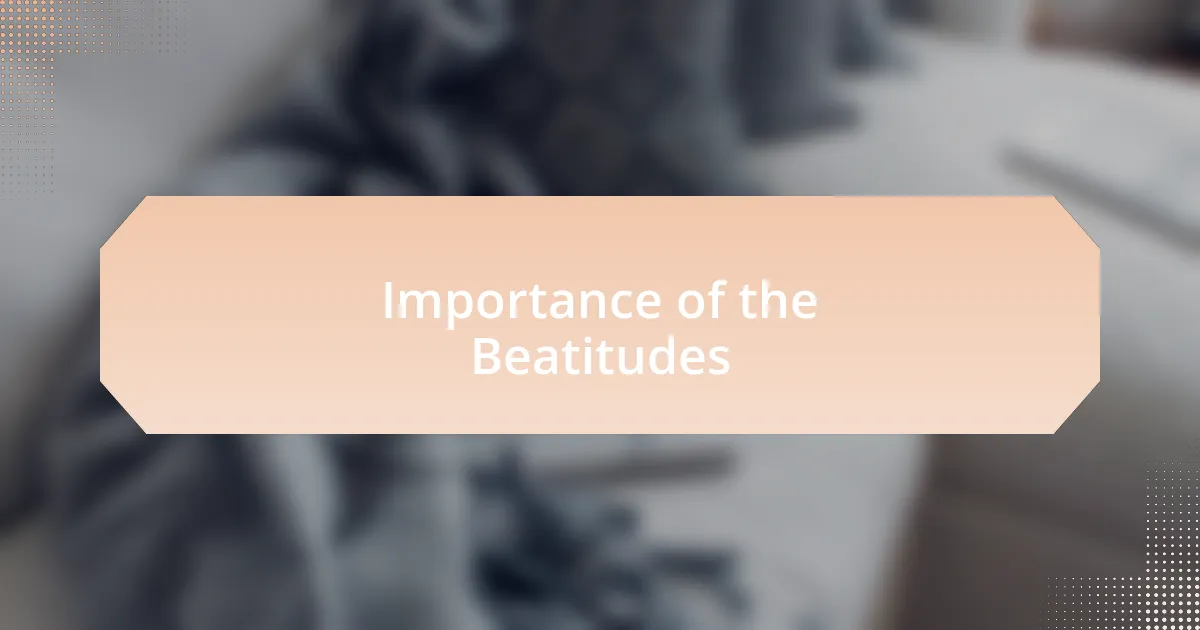
Importance of the Beatitudes
The Beatitudes hold immense importance because they provide a framework for living a life rooted in compassion and understanding. They challenge us to see beyond societal norms and offer a refreshing perspective on what true fulfillment looks like. I remember a moment when I was struggling to empathize with someone going through a tough time. Reflecting on the Beatitude, “Blessed are the merciful, for they shall obtain mercy,” helped me to shift my mindset and approach the situation with kindness.
Moreover, the Beatitudes are a guide for personal transformation. They remind us that our experiences, even the difficult ones, serve as opportunities for growth. For instance, when I faced rejection in a job application, the Beatitude that speaks to the “poor in spirit” resonated deeply. It prompted me to embrace humility and seek God’s guidance, rather than allowing disappointment to harden my heart. Isn’t it fascinating how embracing our weaknesses can strengthen our character?
Ultimately, the teachings of the Beatitudes encourage us to build a sense of community and connection. They inspire us to reach out, support one another, and foster a spirit of love and acceptance. I often reflect on how easy it is to isolate myself in hard times; yet, the Beatitudes remind me that true blessings often arise through shared experiences and mutual support. How can we begin to embody this call to community in our daily lives?
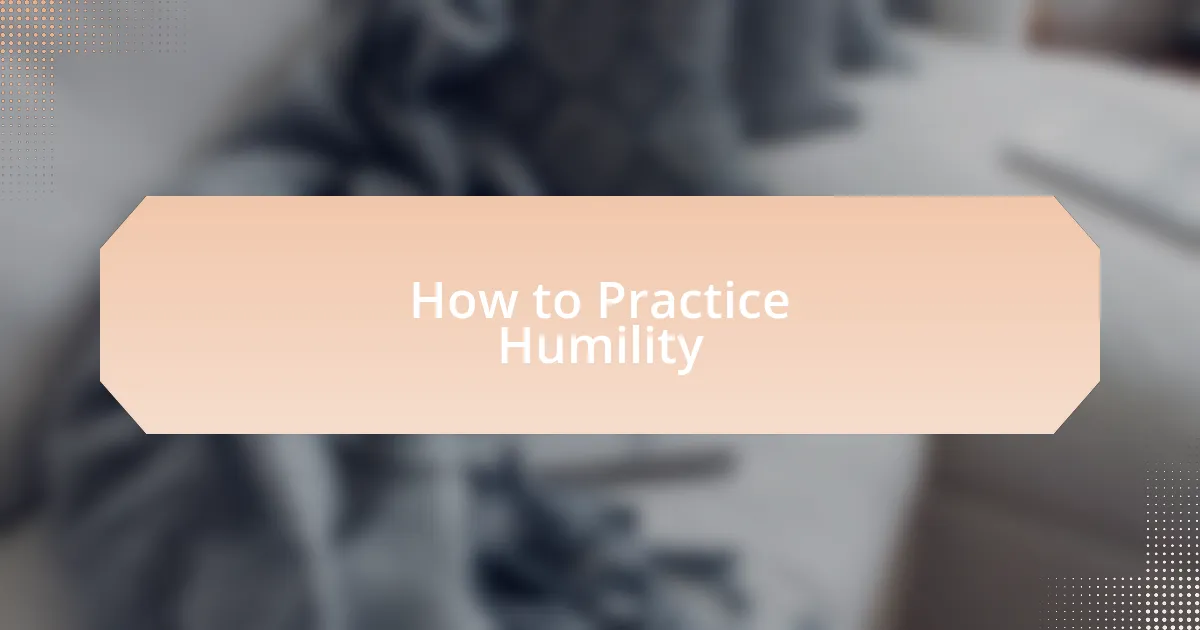
How to Practice Humility
I find practicing humility to be a transformative journey that often starts with self-reflection. For me, embracing my limitations helped me acknowledge that I am not the center of the universe. I recall a time when I volunteered at a local shelter. It was eye-opening to see people who had experienced unimaginable hardships, yet they taught me lessons in gratitude and resilience. Engaging with them made me realize that true humility comes from recognizing our shared humanity.
In my experience, humility also involves being open to constructive feedback. I vividly remember receiving criticism on a project I passionately worked on. Initially, my instinct was to defend my choices, but taking a step back allowed me to appreciate the other perspectives. It was a humbling moment that transformed how I approach collaboration. Have you ever noticed how those uncomfortable conversations can lead to personal growth and deeper connections?
Additionally, I try to practice gratitude daily, which I believe is a cornerstone of humility. By focusing on what I have rather than what I lack, I cultivate a mindset that values others’ contributions and experiences. I keep a gratitude journal where I note down not just the big things, but also the small, everyday blessings. This shift in focus has opened my eyes to the ways others uplift me and the beauty in the world around us. How do you express gratitude in your life?

Living Out Compassion Daily
Living out compassion daily requires intentionality. One moment that sticks with me is when I noticed a colleague struggling under a heavy workload. Instead of focusing solely on my own tasks, I offered to help with their assignments. The relief on their face was a reminder that even small acts can create a ripple effect of kindness. Have you ever taken a moment to lend a hand when someone needed it most?
Compassion isn’t just about grand gestures; often, it’s found in the mundane. For instance, I try to greet my neighbors warmly each morning, weaving a little positivity into our daily routines. These simple interactions have fostered a greater sense of community; I’ve watched as our little exchanges have blossomed into genuine friendships. It makes me wonder, how many opportunities for connection have I missed by rushing through my day?
I’ve learned that showing compassion can also mean listening without judgment. There was a time when a friend faced a personal loss, and I made sure to be there, offering my presence without trying to fix their pain. Just sitting together in silence was profoundly comforting to both of us, and it taught me that sometimes, being compassionate means simply allowing others to feel their feelings. How do you make space for others in your life?
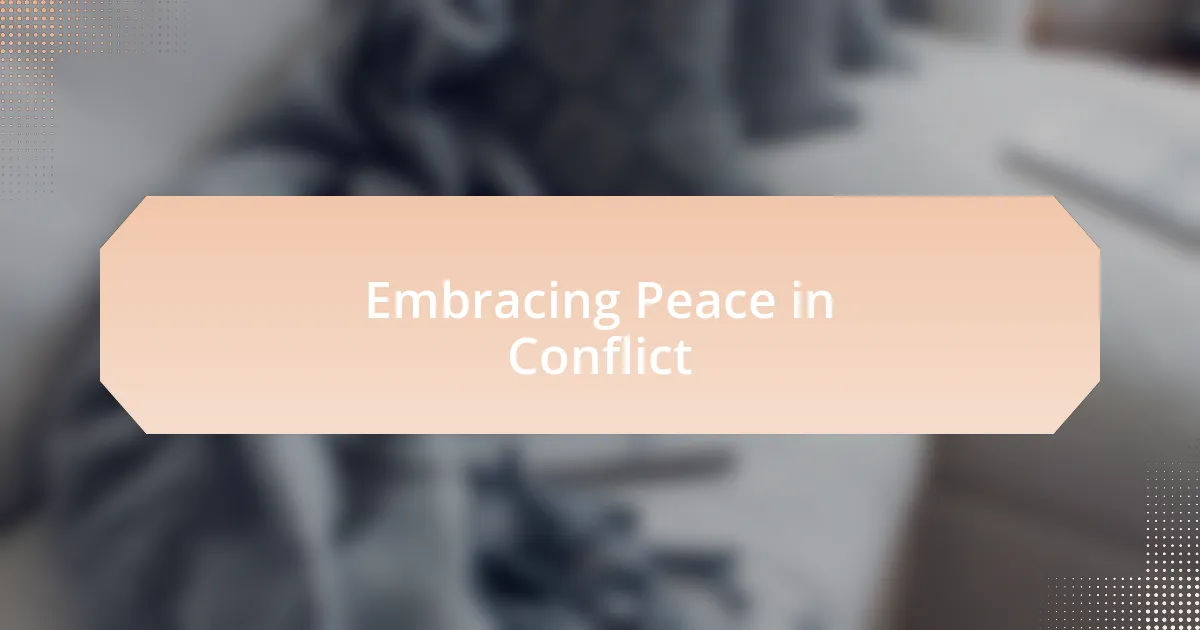
Embracing Peace in Conflict
Embracing peace during conflict can be a transformative experience. I remember a heated disagreement with a family member over a sensitive issue. Instead of escalating the argument, I took a moment to pause and breathe. By choosing to respond calmly, I was able to listen and understand their perspective, ultimately diffusing the tension. Have you ever noticed how taking a breath can shift the atmosphere in a conversation?
In another instance, while volunteering, I witnessed a conflict arise between two individuals with differing opinions. Rather than stepping back, I intervened by facilitating a dialogue where both could express their views. This experience taught me that, sometimes, being a peacekeeper requires us to step forward rather than retreat, promoting understanding through open communication. How do you approach harmony when disagreements arise in your life?
I’ve found that practicing empathy is instrumental in embracing peace in conflict. On a day when tensions were high at work, I made a conscious effort to empathize with a colleague’s frustrations rather than reacting defensively. This not only changed the tone of our interaction but also deepened our professional relationship. I often ask myself: how can empathy serve as a bridge to peace in challenging situations?

Finding Joy in Weakness
Finding joy in weakness has been a profound journey for me. I recall a period in my life when I faced significant challenges that left me feeling vulnerable. Instead of fighting against these feelings, I chose to embrace them. This shift in perspective allowed me to connect with others on a deeper level, revealing a sense of community that I hadn’t fully appreciated before. Have you ever considered that your own struggles can lead to unexpected connections?
Through this experience, I discovered that weakness can spark growth. One day, while volunteering at a local shelter, I shared my own vulnerabilities with the team. To my surprise, it encouraged others to open up about their challenges as well. This honest sharing not only fostered a supportive environment but also reminded me how our weaknesses can be a source of strength and collaboration. How often do we allow ourselves to be authentic, trusting that our fragilities can help create a safe space for others?
There are moments when I still grapple with feelings of inadequacy. However, I’ve learned to acknowledge these emotions without judgment. I remember attending a workshop where the facilitator invited us to list our perceived weaknesses and then explore the gifts that lie within them. This exercise was illuminating for me, revealing that what I once viewed as shortcomings could actually be stepping stones toward personal growth. Have you ever thought about how your weaknesses might serve you in ways you hadn’t expected?
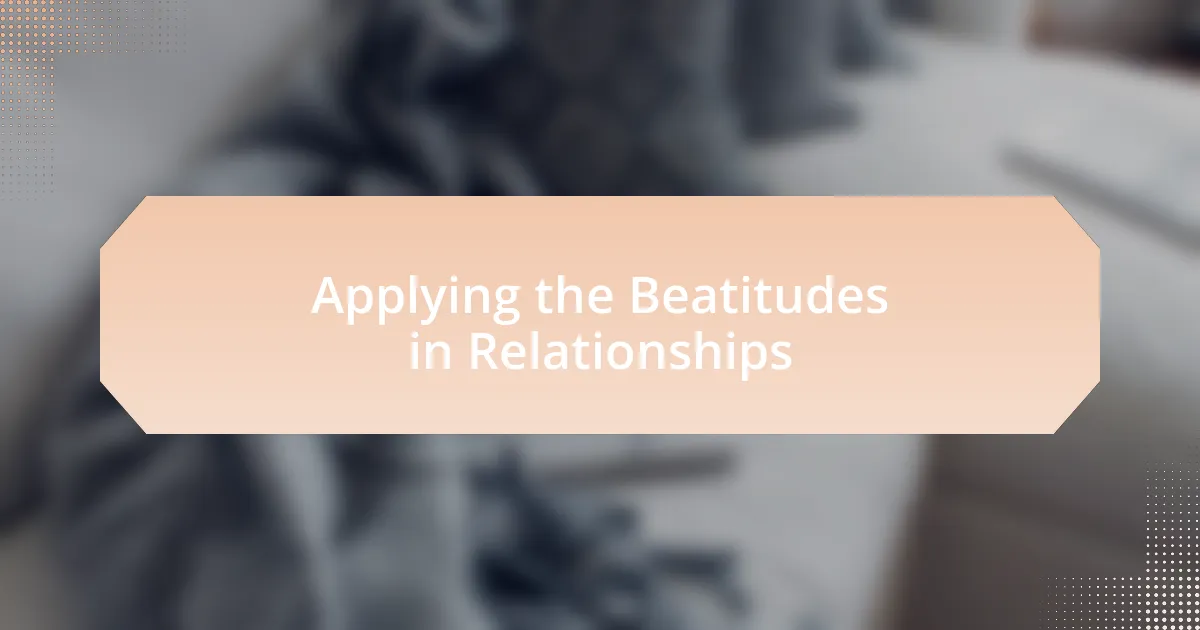
Applying the Beatitudes in Relationships
Applying the Beatitudes in relationships often means embodying qualities like mercy and humility. I recall a time when a close friend was going through a painful breakup. Instead of trying to provide solutions, I simply listened. This act of showing mercy created a safe space for her to express herself. Have you ever noticed how a little compassion can heal wounds that words alone can’t?
Living the Beatitudes also calls for being peacemakers in our interactions. I remember during a heated family dinner when disagreements arose, I consciously chose to seek common ground rather than escalate tensions. By diffusing negativity with kindness, we transformed a potential argument into a heartfelt discussion. How often do you step back to foster peace instead of engaging in conflict?
Additionally, embracing the Beatitudes deepens the bonds in our relationships. I once volunteered at a community center, where I learned the importance of being poor in spirit—appreciating the unique contributions of others. This humility opened my heart to diverse perspectives, enriching my connections with people from different backgrounds. Don’t you find that letting go of pride can invite wonderful new friendships?